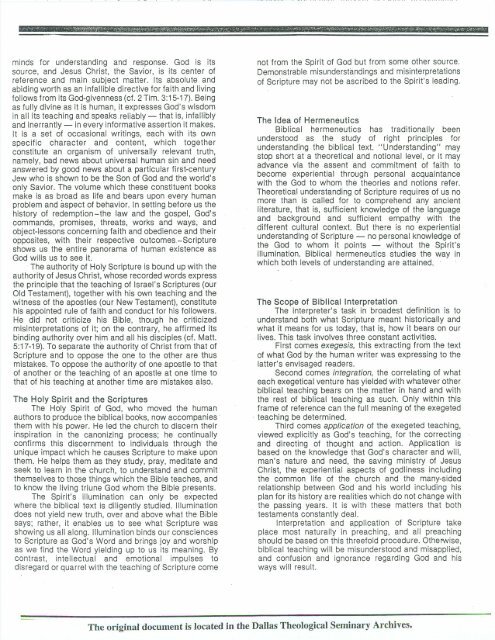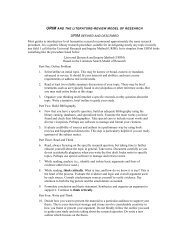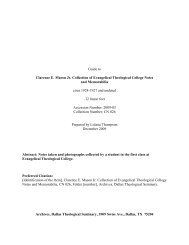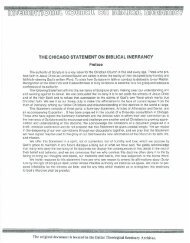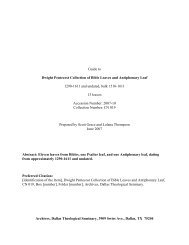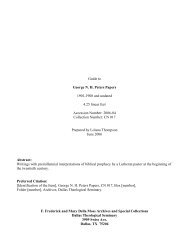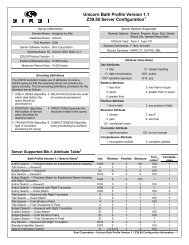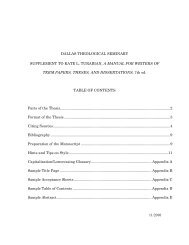Chicago Statement on Biblical Hermeneutics - Dallas Theological ...
Chicago Statement on Biblical Hermeneutics - Dallas Theological ...
Chicago Statement on Biblical Hermeneutics - Dallas Theological ...
You also want an ePaper? Increase the reach of your titles
YUMPU automatically turns print PDFs into web optimized ePapers that Google loves.
l1li ~-~--~o_, ,_.,, WfiUiBl!III Ii ~"'--minds for understanding and resp<strong>on</strong>se. God is itssource, and Jesus Christ, the Savior, is its center ofreference and main subject matter. Its absolute andabiding worth as an infallible directive for faith and livingfollows from its God-givenness (cf. 2 Tim. 3:15-17). Beingas fully divine as it is human, it expresses God's wisdomin all its teaching and speaks. reliably - that is, infalliblyand inerrantly - in every informative asserti<strong>on</strong> it makes.It is a set of occasi<strong>on</strong>al writings, each with its ownspecific character and c<strong>on</strong>tent, which togetherc<strong>on</strong>stitute an organism of universally relevant truth,namely, bad news about universal human sin and needanswered by good news about a particular first-centuryJew who is shown to be the S<strong>on</strong> of God and the world's<strong>on</strong>ly Savior. The volume which these c<strong>on</strong>stituent booksmake is as broad as life and bears up<strong>on</strong> every humanproblem and aspect of behavior. In setting before us thehistory of redempti<strong>on</strong>-the law and the gospel, God'scommands, promises, threats, works and ways; andobject-less<strong>on</strong>s c<strong>on</strong>cerning faith and obedience and theiropposites, with their respective outcomes-Scriptureshows us the entire panorama of human existence asGod wills us to see it.The authority of Holy Scripture is bound up with theauthority of Jesus Christ, whose recorded words expressthe principle that the teaching of Israel's Scriptures (ourOld Testament), together with his own teaching and thewitness of the apostles (our New Testament), c<strong>on</strong>stitutehis appointed rule of faith and c<strong>on</strong>duct for his followers.He did not criticize his Bible, though he criticizedmisinterpretati<strong>on</strong>s of it; <strong>on</strong> the c<strong>on</strong>trary, he affirmed itsbinding authority over him and all his disciples (cf. Matt.5:17-19). To separate the authority of Christ from that ofScripture and to oppose the <strong>on</strong>e to the other are thusmistakes. To oppose the authority of <strong>on</strong>e apostle to thatof another or the teaching of an apostle at <strong>on</strong>e time tothat of his teaching at another time are mistakes also.The Holy Spirit and the ScripturesThe Holy Spirit of God, who moved the humanauthors to produce the biblical books, now accompanies'them with his power. He led the church to discern theirinspirati<strong>on</strong> in the can<strong>on</strong>izing process; he c<strong>on</strong>tinuallyc<strong>on</strong>firms this discernment to individuals through theunique impact which he causes Scripture to make up<strong>on</strong>them. He helps them as they study, pray, meditate andseek to learn in the church, to understand and committhemselves to those things which the Bible teaches, andto know the living triune God whom the Bible presents.The Spirit's illuminati<strong>on</strong> can <strong>on</strong>ly be expectedwhere the biblical text is diligently studied. Illuminati<strong>on</strong>does not yield new truth, over and above what the Biblesays; rather, it enables us to see what Scripture wasshowing us all al<strong>on</strong>g. Illuminati<strong>on</strong> binds our c<strong>on</strong>sciencesto Scripture as God's Word and brings joy and worshipas we find the Word yielding up to us its meaning. Byc<strong>on</strong>trast, intellectual and emoti<strong>on</strong>al impulses todisregard or quarrel with the teaching of Scripture comenot from the Spirit of God but from some other source.Dem<strong>on</strong>strable misunderstandings and misinterpretati<strong>on</strong>sof Scripture may not be ascribed to the Spirit's leading.The Idea of <strong>Hermeneutics</strong><strong>Biblical</strong> hermeneutics has traditi<strong>on</strong>ally beenunderstood as the study of right principles forunderstanding the biblical text. "Understanding" maystop short at a theoretical and noti<strong>on</strong>al level, or it mayadvance via the assent and commitment of faith tobecome experiential through pers<strong>on</strong>al acquaintancewith the God to whom the theories and noti<strong>on</strong>s refer.Theoretical understanding of Scripture requires of us nomore than is called for to comprehend any ancientliterature, that is, sufficient knowledge of the languageand background and sufficient empathy with thedifferent cultural c<strong>on</strong>text. But there is no experientialunderstanding of Scripture - no pers<strong>on</strong>al knowledge ofthe God to whom it points - without the Spirit'silluminati<strong>on</strong>. <strong>Biblical</strong> hermeneutics studies the way inwhich both levels of understanding are attained.' .The Scope of <strong>Biblical</strong> Interpretati<strong>on</strong>The interpreter's task in broadest definiti<strong>on</strong> is tounderstand both what Scripture meant historically andwhat it means for us today, that is, how it bears <strong>on</strong> ourlives. This task involves three c<strong>on</strong>stant activities.First comes exegesis, this extracting from the textof what God by the human writer was expressing to thelatter's envisaged readers.Sec<strong>on</strong>d comes integrati<strong>on</strong>, the correlating of whateach exegetical venture has yielded with whatever otherbiblical teaching bears <strong>on</strong> the matter in hand and withthe rest of biblical teaching as such. Only within thisframe of reference can the full meaning of the exegeted. teaching be determined.Third comes applicati<strong>on</strong> of the exegeted teaching,viewed explicitly as God's teaching, for the correctingand directing of thought and acti<strong>on</strong>. Applicati<strong>on</strong> isbased <strong>on</strong> the knowledge that God's character and will,man's nature and need, the saving ministry of JesusChrist, the experiential aspects of godliness includingthe comm<strong>on</strong> life of the church and the many-sidedrelati<strong>on</strong>ship between God and his world including hisplan for its history are realities which do not change withthe passing years. It is with these matters that bothtestaments c<strong>on</strong>stantly deal.Interpretati<strong>on</strong> and applicati<strong>on</strong> of Scripture takeplace most naturally in preaching, and all preachingshould be based <strong>on</strong> this threefold procedure. Otherwise,biblical teaching will be misunderstood and misapplied,and c<strong>on</strong>fusi<strong>on</strong> and ignorance regarding God and hisways will result.The original document is located in the <strong>Dallas</strong> <strong>Theological</strong> Seminary Archives.


